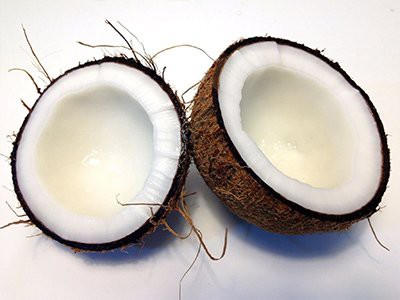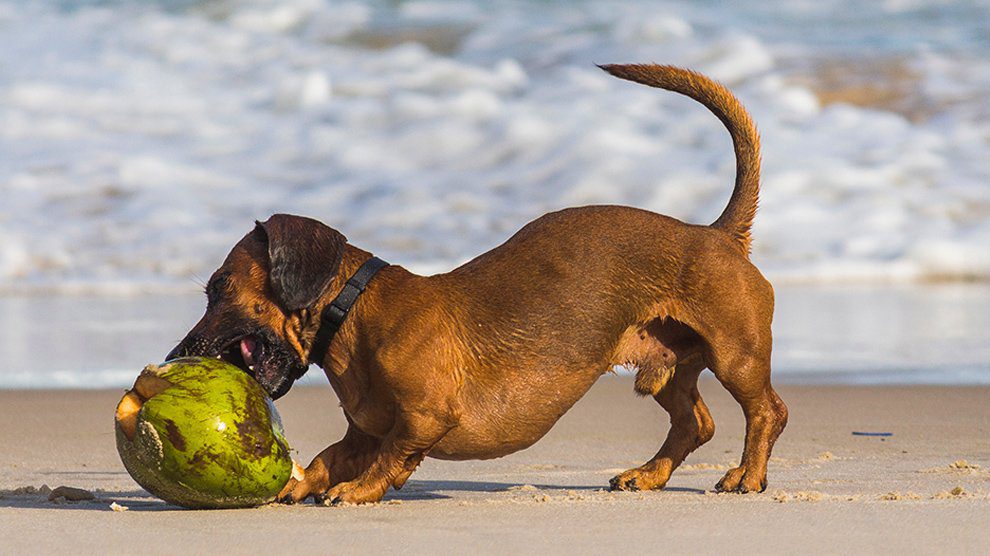Dog Pregnancy Calculator And Timeline
Can Dogs Eat Coconut? Yes. while many may be aware of the fact that dogs can consume coconut oil through their diet, coconuts are also an excellent option for your dog.
Coconut oil has many benefits for its credit. It helps in regulating digestion, preventing and checking allergies, and for the improvement of the canine’s coat.
Even though coconuts do not contain anything toxic, it does contain triglycerides, which has the ability to cause a bloating and gastrointestinal upset.
Coconut For Dogs
Coconut meat contains high levels of lauric acid which are good at preventing influenza. Coconut can also help to treat Giardia, ringworm, and yeast infections. With its anti-inflammatory properties, coconut has the capacity to heal wounds and cuts, etc.
Dogs suffering from arthritis can feel a lot better when fed with coconut because inflammation is one of the primary causes of concern for this trouble.
Remove the shell, otherwise, the pieces can damage your dog’s esophagus and thereby result in blockage and intestinal irritation.
Is Coconut Safe For Dogs?
Coconut contains large quantities of antioxidants which helps to keep the immune system safe and strong. They also provide a wall of defense against fungi, parasites, viruses, and all sorts of bad bacteria.
Highly beneficial for the skin and the coat as the anti-inflammatory properties act as a barrier by preventing flea allergies, hot spots, and yeast infections. Typically, coconut oil behaves like a natural moisturizer and promotes the quick healing of wounds and soothes inflammation.

Health Benefits Of Coconut For Dogs
- Skin benefits – Coconut oil is good for your dog’s skin and the healing properties of coconut can be highly beneficial for your dog. It holds high values of antibacterial, antifungal, and antiviral properties making it an essential illness-fighting oil for the canines.
- Improves the immune system – It not only improves the immune system, but coconut also acts as a good treat for a dog that’s recovering from injury.
- Decreases inflammation – The presence of lauric acid in coconut protects the dog against influenza. In a lab study, rats that were fed with coconut displayed reduced swelling.
Can My Dog Drink Coconut Water?
Yes. you can give coconut water to your dog. It has plenty of minerals, vitamins, and other nutrients. Also, it is full of electrolytes and you can give it as a treat.
Overall, coconut is not poisonous to dogs, but it’s always better to consult a vet before feeding. In case, if your dog loves the flavor of coconut, feel happy to give him a small piece.
Can Dogs Eat Coconut Oil?
Of course! It is healthy and has more benefits.
It provides high energy levels to dogs, gives protection to them from illness and heals the wounds in a speedy manner. Also, it improves digestion, coat, and skin of your dog and reduces allergic reactions.
The secret behind these benefits is 90% of saturated fat and “medium-chain triglycerides” in it. Medium-chain triglycerides are good fat that also keeps the thyroid levels of your dog in balance, helps to lose weight and keeps your dog active and energetic as well.
Also, the lauric acid helps your dog to fight against allergic reactions caused by bacteria, virus or fungus.
But, always give a little amount of it to your dog as too much can lead to diarrhea. Ensure that you are giving less than a half spoon to puppies and small dogs. For large dogs, 1 teaspoon is enough.
Can Dogs Eat Coconut Flour?
Yes. It is a healthy treat for your dog as it is a fiber-rich product. This flour contains 35% dietary fiber and it helps to lower the cholesterol levels and improves digestion as well.
This product also has only 10% of carbohydrates that are digestible. It is also free of wheat and gluten. So, it is a non-allergic food item to your dog.
Another advantage is that this product contains medium-chain triglycerides, which are nothing but saturated fats. These fats are healthy and help in metabolism. Also, they fight against bacteria causing urinary tract infections, stomach ulcers, and cavities in teeth.
A protein-rich product, you can feed it to your dog as an alternative to meat. It is also well suitable for dogs having diabetes or having high cholesterol levels.
Can Dogs Have Coconut Milk?
Of course, he can have it. It is a non-toxic, less sweetened and mild-flavored form of coconut. Also, it helps to improve the immune system and makes the dog’s coat shiny and strong. In addition, some enzymes reduce the bad breath in dogs.
But, it is essential to know whether your dog likes or dislikes this product. Your dog will bark, drool, stare at you or sometimes paw at you to ask for more. It is advisable that you should not force your dog to drink it in cases if he does not like it.
It is also better always to feed plain and unsweetened coconut milk to your dog. Also, feed him in moderation as too much amount may upset your dog’s stomach.
Coconut Dog Treats
It’s no wonder that these treats are healthy for your dog.
So, can dogs eat coconut treats? Let’s see what kind of treats you can give it to your dog. Let’s see what kind of treats you can give it to your dog.
- You can give either fresh or dry coconut chunks to your dog. It will be a nutritious and healthy snack for your dog.
- Coconut chips are also rich in dietary fiber. You can feed it to your dog.
- Ensure that no sugar and chemicals are added to these treats.
Coconut Oil For Dog’s Paws
It is an amazing antibiotic for your dog. A natural healer, it makes your dog get speedy recovery from wounds and infections.
This natural product also prevents fungal and yeast infections due to its antibacterial, antiviral and antifungal properties. It also provides relief to the dry and itchy skin of your dog. It also improves the look and feels of your dog’s coat.
During the winter season, the paws of your dog may become dry and cracked. But, applying it on his paws will heal and soothes his skin. You also do not need to worry if your pet licks his oily paws as it is a non-toxic product!
It is further providing benefits to your dog’s pads at the bottom of the paws. You can use it on the itchy, easily breakable paws and paws with hot spots.
But, always ensure that you are using organic, virgin coconut oil to your dog.
How To Apply Coconut Oil To Your Dog?
It is essential to know how to apply this oil to your dog as pets are different from humans! Let’s see the step-by-step procedure of applying it for dry and itchy skin for your dog.
- After you bath your dog, rub a little amount of virgin, organic, cold-pressed coconut oil to your hands first. Then, run your fingers all over his body and massage his skin, coat, ears, and paws.
- Allow the oil to stay on his body for about 10 minutes.
- Rinse your dog with water first and then with shampoo. Ensure that the dog’s skin is not greasy.
- Let the skin dry using a towel.
You can do this skin treatment to your dog once a week. You can also do the same treatment for your dog’s paws.
Coconut Oil Negative Side Effects
Although it has more benefits, it may cause some side effects as well. It is believed that commercial coconut oil has side effects and not the virgin one.
Some dogs may be allergic to this product. Giving an excess amount will also lead to diarrhea in dogs. Also, you should not give it to dogs having pancreatitis.
Some studies also report that it may increase total cholesterol levels as well as bad cholesterol levels in dogs. Finally, it may lead to fat deposition in the arteries.
As it is rich in calories, a high amount of this natural product may cause weight gain as well. Another study also reports that saturated fat in coconut reduces the dog’s ability to detect scents.
So, it is better to consult the vet before feeding it to your dog if he is an overweight dog, prone to allergies and has pancreatitis, etc.


















